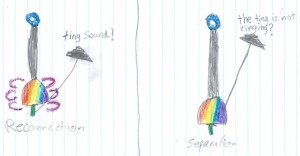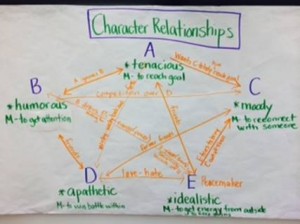Every Wednesday morning the halls are abuzz with incredible energy for Opera Class. Students walk from place to place with purpose. They know they have a job and they must be prepared. From 9:30 – 11:30 a.m. we meet as a company to work in our respective job groups. Our talented and dedicated volunteers work with us as we specialize in learning the specific skills necessary to carry out the responsibilities in creating an original opera. Each company member becomes an expert in his or her field. The groups work independently. Then, little by little, as we move through the process, students recognize the significance and purpose of each job group and learn that without all groups combining effort and commitment, the opera could not happen. A sense of interdependence is born. There’s no turning back. It’s all for one and one for all.
All Aboard
Having an authentic field experience engages students on numerous levels. It shows how the work we do in our classroom translates and is applied to the real world. The purpose for everything we do is connected to something meaningful and real for students.
A trip to the train station brought to life our study of setting. We weren’t just reading books about train stations and looking at pictures and paintings, but getting an up-close, detailed tour of our very own Union Station in Washington, DC. Our tour guides, Michele, Debbie and Jamie dazzled us with stories about the history of the station and the trains that pass through everyday. We boarded the Acela, receiving a first class experience from all Amtrak personnel busy at work. One of our composers, Daylon, was invited to take a seat in the conductor’s chair. At the helm of all controls, Daylon rang the bell, turned on the windshield wipers and adjusted the side view mirrors.
A Story is Born – The Plot Thickens (Video)
From intricate opera character relationships, a story is born. Conflicts, directly transferred from our collective lives to our original characters, come to life and create a storyline sure to make us think. The process for writing our scenario begins as we determine how our primary and secondary conflicts develop and are resolved in our setting, a train station. Why are the characters at the station, together? What events and activities take place that enable us to see the conflicts played out in a believable fashion? What is logical? How do we see these situations in our daily lives? How do we show connections to our theme and thesis throughout the story? What is the central message we wish to deliver to our audience?
[Read more…] about A Story is Born – The Plot Thickens (Video)
Learn to Yield, Yield to Learn
For years I have worked on teaching my class the art of yielding to others. The idea of facilitating a student led discussion with twenty-four students, where no one raises a hand asking permission to speak, but everyone contributes to the conversation has always intrigued me. When should I speak? When is it better to hold my tongue and allow others to be heard? How does knowing when to speak help me as an individual and help my class as a whole?
For many, this may seem an impossible feat, but for Lightning Strike Kids Opera Company, anything is possible.
Washington National Opera Costume Studio Tour
The Washington National Opera graciously hosted Lightning Strike Kids Opera Company for a tour of its costume department. Upon arrival, our eyes and ears were open to the incredible sights and sounds of a working rehearsal venue. As we listened to stories about opera and the costumes that bring those stories to life, we heard an occasional soprano voice or piano coming from rehearsal rooms in the distance. What an amazing experience. We also enjoyed a professional stage make-up demonstration. But the most memorable moment was trying on actual costumes, previously worn by opera singers.
[Read more…] about Washington National Opera Costume Studio Tour
Encouraging Young Writers (Video)
What is it that inspires us to put pencil to paper?
A song? A poem? An experience? An emotional response to our world?
So many things happen in the lives of children everyday that illicit strong feelings and powerful, personal responses. Providing the space and time necessary to share these thoughts, feelings and ideas in writing is critical for young writers to blossom.
To facilitate and foster a life-long love for writing, children need positive feedback and encouragement from teachers, peers and parents. But most of all, they need to write about their passions, interests and aspirations. What they care about deeply and that which has profound meaning to them is key. As teachers, we must help our students discover their true talents, gifts and abilities by providing authentic experiences that engage all types of learners.
Solving Authentic Problems in Mathematics
If we want it or need it, we engage and learn it.
The curriculum is often devoid of meaning unless we connect the dots and integrate the learning process to the real world. “What are we learning?” and “Why are we learning it?” should be questions kids can readily answer as they apply the skills they learn in authentic contexts.
The opera process provides daily opportunities for this authentic application of real world skills across disciplines.
On March 7, we plan to attend the Washington National Opera’s Look-In performance of the opera Moby Dick at The Kennedy Center for the Performing Arts in Washington, DC. Tickets must be reserved and paid for in advance by check or money order. When the school secretary asked for the check amount to include with the registration, I presented the situation to the kids and they immediately set to work, knowing that it was their responsibility to determine an accurate amount so that seats could be secured in a timely fashion. They wanted it. They needed it. They solved it.
[Read more…] about Solving Authentic Problems in Mathematics
Our Setting is Determined! (Video)
Students must clearly understand setting and how it can enhance the plot and illuminate character relationships, conflict and resolution. We revisit books we have used for multiple purposes and focus on setting as an essential element in telling the story. Citing specific text and illustrations that give clues about time and place serve to clarify the interdependence of setting and other elements of a story. While reading and listening to Mozart’s Magic Flute, students create detailed drawings illustrating their vision of setting as portrayed through textual clues. They are now ready to move forward in the selection process.
What Does Reconnection Sound Like?
Character Relationships
How do we relate to one another? How do our dominant traits and motivation affect and define our relationships with others? Through improvisation and partner discussion, company members determined the unique relationships among the five characters. Given all that we know about these beings we have created, what seems logical? Where do we see conflict? Where do we see connection? The complex discussions that ensued as a result of these questions inspired numerous possibilities and encouraged the students to probe deeper into “who we are and what makes us tick.”

